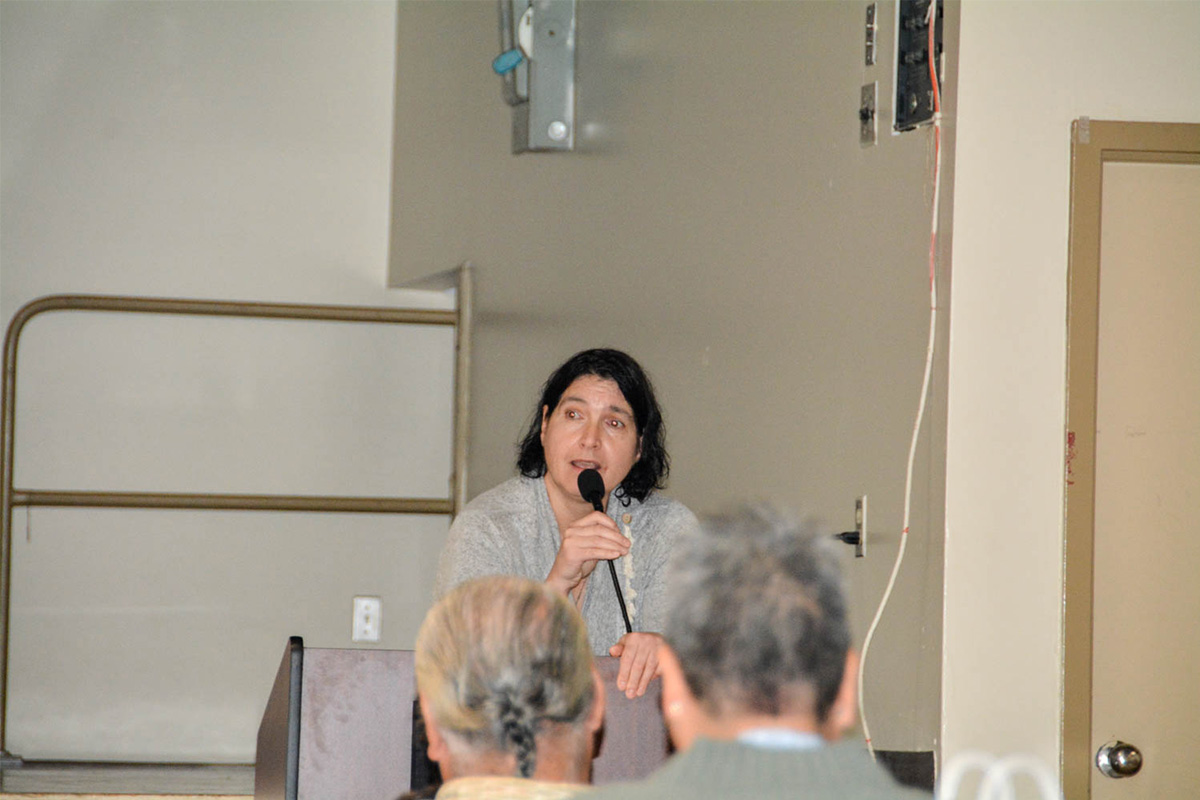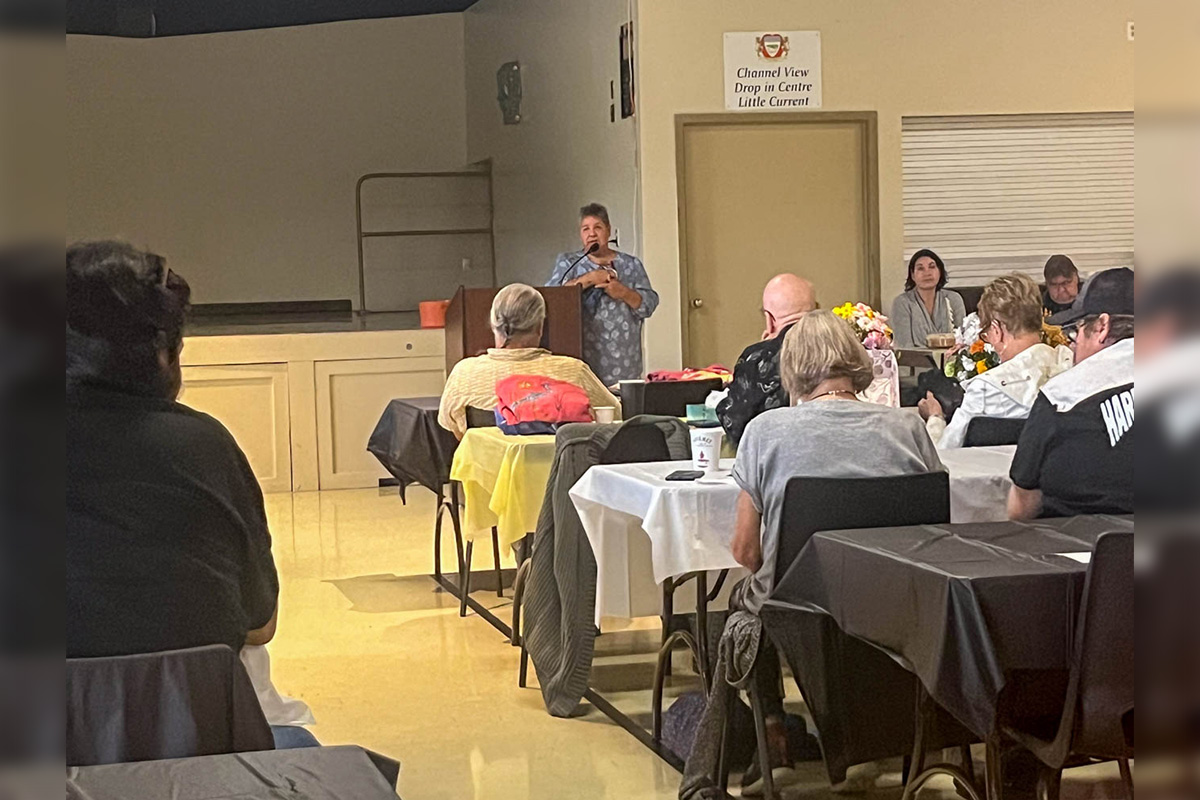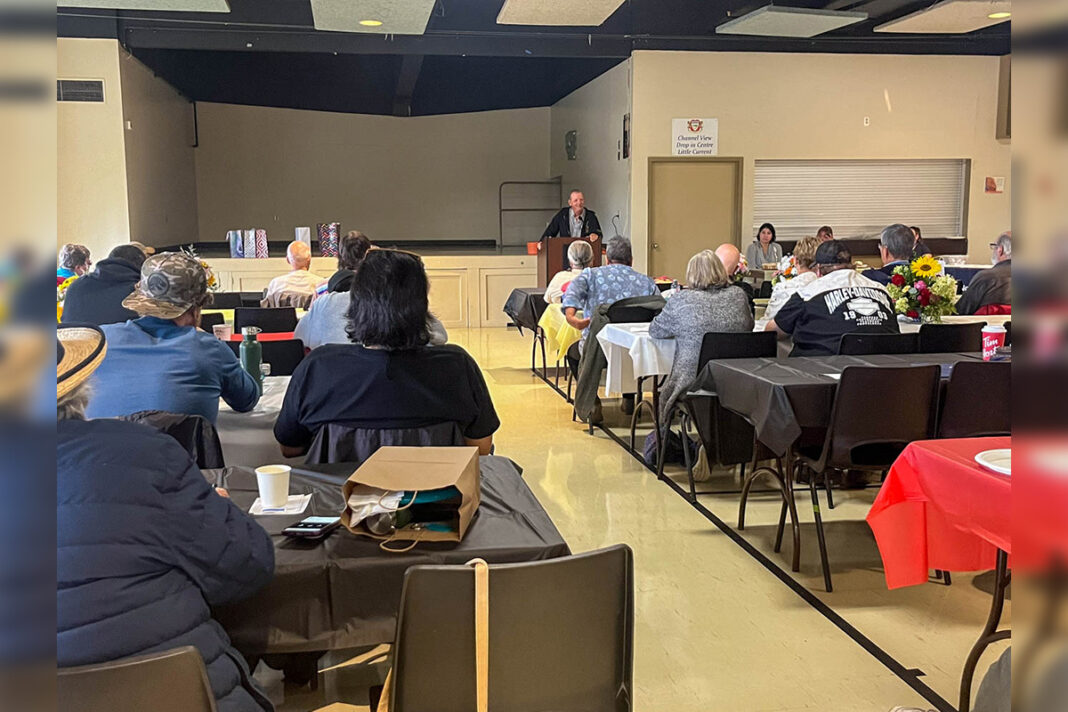LITTLE CURRENT—The hall of the Northeast Town recreation centre was filled with people who had come to hear the stories of hope and inspiration from the annual Manitoulin Addictions Recovery Breakfast held late last month, hosted by Noojmowin Teg Health Services.
Following an opening prayer by elder Josh Eshkawkogan, Mr. Eshkawkogan invited Fawn Pettifer to the microphone to say a few words. Ms. Pettifer was not on the agenda, but her words struck a chord with everyone present.
She began by noting that everyone has their own unique healing path because everyone is a unique individual—there is no cookie cutter approach. Ms. Pettifer acknowledged being traumatized throughout her life and, as such, she was always searching for a healing path that would work for her.

“I’m continuously looking for answers, specifically ‘who is this person looking out at the world?’” she shared. This path has brought her to religion, specifically Jehovah’s Witnesses, which she credits with teaching her the skills of research; then to education and career; then on to a connection with the land, which brought her to New Zealand and then home again.
“When I came back home, I didn’t feel as welcomed as I hoped to be,” Ms. Pettifer said. “I had no support and was surrounded by people who were unwell. I, then, became unwell.”
At that time Ms. Pettifer “found Gwekwaadziwan Miikan and that allowed me to connect with the land I so craved.”
“I can honestly say that for the first time I connected to spirit while I was out on the land…but that wasn’t enough.”
Like many in recovery, Ms. Pettifer left the program and went home, believing herself to be “cured,” but she was still surrounded by unhealthy people and she relapsed. Gwekwaadziwan’s aftercare program allowed her to remove herself from her current situation and she took advantage of that program for a year. It was while there that Ms. Pettifer got accepted into a master of social work program.

“Here I am, working toward my masters while on a healing journey,” she said. She credits Tina and Josh Eshkawkogan with teaching her about sacred medicines and the gifts of ceremony during this time.
Ms. Pettifer graduated from her program and continues to better herself by taking courses at every opportunity that connect her to spirit, mind, heart and body. It is her hope to open her own practice.
Jerry Hilton, of Espanola, was the first guest speaker of the breakfast and he introduced himself in the manner of those who abide by the 12-step program and declared himself openly to be a “recovered alcoholic.”
He shared that he had his first drink at an early age 8, and tried drugs by 10. “I instantly loved the feeling even though I was sick as a dog.”
Mr. Hilton told the audience that he was abused by a Sunday school teacher as a child. “This caused me to seek out alcohol because it made all those feelings go away,” he said. “And drug use made me feel free. The drug use just went on and on—it became who I was. It infiltrated everything in my life.”
By 14, Mr. Hilton had dropped out of school to go to work. By 16 he had robbed a store with a loaded gun and by 17 he was serving two years less a day in jail.
“All my relationships, all work, just disappeared,” he said. They say ‘alcohol is the great remover,’ and that’s what happened to me.”
“I lived a life with no hope,” he continued. “The world was out to get me and people sucked. Anyone who called me on my stuff was the enemy, and that was everyone in my life. I was going downhill, fast, with no brakes.”
In 1989 Mr. Hilton had his first child and in 1992 he was married. The couple’s second child was born in 1994. In 1996 he found “the roots of recovery.”
“The 12 steps have saved my life,” he said.
Mr. Hilton said that while sober he still wasn’t acknowledging all that he needed to. He “minimized the stuff that was big and maximized the stuff that was small.” He secured a sponsor—a key aspect of the 12-step program—and shared his life story. “For the first time in my life someone related to me.”
“The further I went into recovery, the more I worked on myself, the more people turned to him,” he said.
At 37 he went back to school and took drug and alcohol counselling at Canadore College.
While at school he decided he didn’t need Alcoholics Anonymous anymore. He was learning this stuff in school every day, after all. “I immediately began to lie.”
Mr. Hilton went on to extol the support gained from 12-step programs, unasked.
“Recovery can’t help me solve all my stuff, but it keeps me rational enough to know I need outside help,” he said. “I went through life trying to be a human having a spiritual experience, but I came to realize I was a spiritual being trying to have a human experience.”
Mr. Hilton has spent his life dedicated to helping others in recovery.
Near the conclusion of his talk, Mr. Hilton shared the heartbreaking news that his family, like so many others, did not escape the opioid crisis unscathed. Within one year of each other, Mr. Hilton lost a step-daughter and a daughter to overdose.
Annette of Missisauga First Nation was also invited to speak. Like Mr. Hilton, she identified herself as a recovering alcoholic.
She shared that she grew up in an alcoholic home and found sobriety on January 19, 1991. She credited her then- four-year-old son with leading her to this path.
“This little boy told me who I was and told me the honest truth about how I was affecting his life,” she said, recounting the tale of she and her son walking along the roadside to get to the store when a car drove past. As one does in a small town, Annette waved and the driver waved back. Her son looked up at his mother and asked, ‘mommy, is that who you’re going to sleep with tonight?’
After that revelation, Annette checked herself into Camilla House in Elliot Lake.
“For me, the most important thing was reconnecting with Creator, my spiritual being,” she shared. “I trusted a power that was greater than myself and I live by that to this day.”
She said the sponsors, friendships, knowledge learned at conferences, spiritual advisers she came across over the years, all seeped into her soul. “I didn’t know that all of these things that I learned, that I heard, would come back to me at a critical point in my life. That little boy who helped me to get on to the path passed away four years ago.”
Annette broke down and was immediately enveloped in a cloud of smudge as an eagle wing covered her in sacred medicines as she regrouped.
“I almost let go of my sobriety through that time,” she admitted. “Ever since that day my recovery has taken on a whole new meeting—one of spiritual recovery.”
“I believe my son was born to help me get sober,” Annette continued. “When he passed away, again his voice is the only one I’ve been listening to.”
Manitoulin services such as Mnaamadzawin Health Services, Naande Miikwan, Narcotics Anonymous, Gwekwaadziwan Miikan, Manitoulin Legal Clinic, Manitoulin Family Resources and the Manitoulin Drug Strategy were all on hand to provide information and support to anyone wishing to talk.





